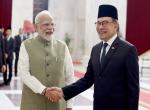One of the defining moments in my life was when I was on deputation to Princeton University for a mid-career course. It was the height of the Vietnamese War and the United States was in ferment because many people, especially students, opposed the war because they did not feel it justified. Many liberals thought that the United States had taken over the colonial mantle of the French, who ruled Indo-China. The Americans, therefore, were fighting an unjust war in which, despite the fact that a major contender for power in Vietnam was the Communist Party; the South Vietnamese regime was not really legitimate because it was a puppet of the colonial rulers. This was the regime that was supported by the Americans. Lyndon Johnson, the President of the United States who was constitutionally eligible for one more term, made a public broadcast that his policies had split apart the nation and, therefore, he was not offering himself as a candidate for the post of President. I call this a defining moment because despite the fact that Lyndon Johnson was not a pronounced liberal or the best example of a principled politician, he was at least mature enough and responsible enough to realise that he could not offer America the kind of leadership it needed at this time of crisis and, therefore, he was voluntarily withdrawing from the field.
The King of England reigns but does not rule. Kind Edward VIII fell in love with a divorced American woman, Wallis Simpson and wanted to marry her. The Prime Minister advised that this marriage was not acceptable, even as a morganatic marriage, to the government, parliament and people at large and he advised the King not to enter into this matrimonial alliance. In many ways Edward VIII was a weak man, but rather than giving up the woman he loved he preferred to give up the throne of Great Britain. In doing so, in choosing the woman he loved above the Crown, Edward VIII did recover some of the character which a king should have. This is a case where principles and statecraft triumphed over a desire to hang on to a position. There are many countries in the world where politicians have stepped down because their conduct could no longer pass scrutiny. Yoshihiro Tanaka, Prime Minister of Japan, resigned when he was accused of taking a bribe of two million dollars from the Lockheed Corporation. The party demanded that he resign and he obliged immediately. He was ultimately convicted of the offence and given a jail sentence, but he did not stay in office a day longer than was justified by his conduct and he thereby saved the post of PM from public opprobrium and contempt. John Porfumo, a senior minister in Britain, resigned when it came to light that he had bribed a prostitute in order to buy her silence. Even Margaret Thatcher quit as Prime Minister when her party asked her to step down. She did not form a rival party in protest, as happens so often in India. In all those countries where politicians follow a code of conduct being in power is not the ultimate goal and losing power is not the ultimate shame.
It is not as if Indian politicians never followed a code of conduct or ethics which transcended the purely legalistic or the narrowly defined rules of propriety. T.T. Krishnamachari resigned as Finance Minister because of certain allegations relating to the Life Insurance Corporation of India. Lal Bahadur Shastri resigned as Railway Minster because he felt that he failed in his duty to ensure railway safety and an accident occurred killing a large number of passengers. There never was an allegation that the minister was himself in any way negligent or remiss in his duties, but he was a dead honest politician who felt moral responsibility for the way in which his ministry functioned. Madhavrao Scindia resigned as Civil Aviation Minister after the crash of a newly acquired Airbus 320 at Hyderabad despite the fact that an enquiry proved that the accident was caused by pilot error only. LK Advani also resigned from all public offices, including in the BJP organisations, because of the Jain Hawala case in which investigation later revealed that he had no hand whatsoever. These four politicians quit not because they were pressurised to do so but because they answered to a higher inner voice which reminded them of their moral duty. There have been other resignations also, such as two Chief Ministers of Maharashtra, but all these resignations followed proven wrongdoing, which forced the party in question to insist on such resignation. Today’s politician seems to be a breed apart from our earlier politicians who, perhaps because of Gandhian principles, did accept that conscience is also a factor in governance and that if they have done wrong, wittingly or unwittingly, they should accept moral responsibility for their acts of omission and commission. The present generation of politicians and, for that matter, bureaucrats, seems to feel that all that is needed is not to be caught in wrongdoing. Doing illegal or improper acts which benefit them personally are considered not only to be in order but almost to be a perquisite of office which they would be foolish not to enjoy.
How does the voice of conscience operate? A very good example would be that of the late Kaka Saheb, that is, N.V. Gadgil. He was Minister for Works and Housing at the Centre, he was a contemporary and close colleague of Mahatma Gandhi, Jawaharlal Nehru and Sardar Patel and he was austere, hard working and honest. His Private Secretary was another outstanding Civil Servant called D.S. Borker. On a visit to Bombay Kaka Saheb Gadgil decided to inspect some of the CPWD works. In those days perhaps the highest ranking CPWD officer in Bombay was an Executive Engineer and he accompanied the Minister during the inspection tour. At lunch time he invited the Minister to eat with him at home. After the meal when Kaka Saheb and Borker Saheb departed, in the car the Minister told his Secretary that an enquiry should be held against the Engineer to ascertain how he was able to feed the Minister in silver thalis and whether the Engineer was honest or not. Borker Saheb turned to the Minister and asked whether he had read what was inscribed on the thalis. He told him that the thalis were shown to be the property of Mafatlal Group’s guest house and had been borrowed by the Engineer because he did not have utensils of a quality in which he felt he should feed the visiting dignitary. Kaka Saheb immediately ordered the driver to return to the Engineer’s residence. That gentleman was taken aback at the Minister’s return, but Kaka Saheb told him that he had come to apologise for having an unjustified thought in his mind about the integrity of the Engineer. Such was the conscience of the man, who refused to harbour an evil thought about his subordinate on account of pure conjecture. Perhaps we can not all be Kaka Saheb but surely our politicians can at least begin to distinguish between right and wrong and to behave accordingly. In this we do not need a lesson from the West.
It would be foolish to insist that there has been no erosion of values in India. We are no longer governed according to the principles laid down by Mahatma Gandhi. The change is best exemplified by a small article written for the Times of India by Shri Sriprakasa, a senior Congress leader, a Gandhian, a former Central Minister and Governor of Assam. He narrated an incident where after retirement he was required to travel from Bombay to Madras in order to attend a meeting. His granddaughter came to visit him in the evening and found him sitting morose. On being asked why grandpa was sad she was told that he had to cancel his visit to Madras because railway reservation and ticket were not available. The granddaughter said that she would get him the ticket, which she did next morning. When Sriprakasa asked her how she managed this miracle she blithely told him that she had bribed a ticket agent Rs. 50 and was able to obtain the ticket. Sriprakasa told her that he would have been unable to do this because he was born in the land of Gandhi and could not give a bribe. The granddaughter said that she, too, was born in the land of Gandhi but she had no difficulty in paying something extra for the ticket. Sriprakasa’s comment was classic. He said, “My child, my Gandhi was Mohandas Karamchand and yours is Indira”. I think this example amply illustrates how our value systems have eroded and that it is now considered quite legitimate to use even questionable means to attain one’s objective. This is a very dangerous thing to happen to any nation, more so to a country which has always prided itself on its sense of morality and decency.
For the first twenty years of independence our politicians were still guided by the principles of satya, ahimsa, austerity and impeccable personal integrity as taught by the Mahatma. The year 1967 saw the emergence of a new culture of purchasing legislators in order to gain power, thus awakening in them a sense of commanding a price and for this purpose to forego every principle of good conduct. The decline in public morality has been so rapid that it is difficult in India to point to an honest politician, official or businessman. Every field of human endeavour is now pervaded with a sense of selfishness in which personal gain has replaced any desire for national service. Jawans of the army are put to risk if their weapons are faulty, but there does not seem to be any qualm of conscience in buying defective weapons after taking hefty bribes. Hospital patients face the difference between life and death, depending on the quality of the drugs that are administered to them. Despite this drug manufacturers and retailers offer spurious drugs and doctors happily purchase them on account of large commissions received by them. Who cares for the patients? The Gwalior region and western U.P., both areas renowned in the past for the quality of milk and milk products, are today centres of production of synthetic milk which contains poisonous detergents, fertilisers, etc., and is positively toxic. Mawa, the base of so many Indian sweetmeats, is adulterated and we virtually eat poison when we consume sweets at festivals. Most food products are adulterated. The automobile industry, especially the service stations which maintain vehicles, is known for imitation parts substituting for the genuine at the time of repairs, which endangers the road worthiness of vehicles and is substantially responsible for so many accidents. Appointment in service is often done on the basis of bribes offered, contracts are sanctioned in a similar way, construction is defective because essential materials are either adulterated or stolen and are substituted by spurious materials, functions are organised on paper and the money is swallowed up and even in the matter of such items of national and international importance as the Commonwealth Games, the making of money illegally seems to supercede the need to complete the projects in time and of the quality and standard which is required of such construction. It is a horrifying tale in which ultimately the average citizen becomes the prey, politicians and officials are the predators, unscrupulous businessmen are the beneficiaries and the nation is the loser.
Where do we begin in cleansing of the system? The constitutional arrangement of government in the country is that policy decisions and broad rules and regulations for implementation of policy lie firmly within the domain of the Legislature, the elected members of the Legislature and, by implication, in the parties which support the legislators. Who will stand for election is determined by each individual political party. These parties, therefore, are a part of the overall system of governance that we have adopted. Because it is the party which chooses the candidate, it is of the very essence that the political parties themselves should be responsible, conscious of their national duty and with office bearers of impeccable integrity. Ministers and officials may be covered by the Prevention of Corruption Act, but one cannot expect honest politicians to come from a party whose office bearers are not themselves completely honest and who, therefore, cannot insist on high moral standards being adhered to by the representatives of the party in public office. If a minister, on account of holding public office, must accept a code of conduct which is more restrictive and stringent than what applies to an ordinary citizen, then the office bearers of the political parties to which the holders of public office belong have also to adhere to such a strict code of conduct. This code must not only lay down the rules for the party and its office bearers but also the moral values according to which the party and its members will work. By definition the head of the party has to be a person who can be respected, not only because he is politically astute but also because he is known to be a person of integrity and high moral principles. This puts political leaders a notch above even Caesar’s wife, because they have to be not only seen to be honest and above suspicion but also must be proactive in enforcing a code of conduct on their party members. It is against this benchmark that political leaders have to be judged.
There has been a spate of complaints by neo activists such as Arvind Kejriwal and professional complainants such as Subramaniam Swamy against Sonia Gandhi, Rahul Gandhi, Robert Vadra, Nitin Gadkari, the Ambani brothers, etc. Some people refer to these activists as crusaders. A contrary view could be what Mahatma Gandhi said about Katherine Mayo’s scurrilous book on India, which he described as, “A gutter inspector’s report”. However, there is no gainsaying that corruption levels are high. Because the highly placed are generally not touched by our investigating agencies, the political parties concerned themselves do not have a mechanism by which they watch and judge the conduct of their own office holders or prominent supporters and then take action suo motu against those who have fallen below acceptable standards. Robert Vadra is not a Congressman, but he is the son-in-law of the lady who is President of the Congress. Without in any way applying judgment to the allegations I would still suggest that the Congress Party should have had an inbuilt mechanism similar to an Ombudsman, which mechanism should have persons of universally accepted credibility, who could conduct internal enquiries into allegations made against the party’s leaders and then come out with a reasoned report of what they have observed. If the report is objective then where it finds the charges to have substance, it would set the public mind at rest either because the party has taken action against the guilty person or the party has found the person not to be guilty and made known publicly the reasons for the findings.
This would apply equally to BJP, where Nitin Gadkari, its President, is under fire. A credible enquiry which finds one way or the other about the charges would be in the interest of the party itself. If Nitin Gadkari has done no wrong then detailed reasons for arriving at this conclusion must be given. If, however, Nitin Gadkari has strayed from the straight and narrow then the party itself must take action against him. The present attitude of the party in which it has given a tongue in cheek clean chit to Gadkari is neither in the interest of Gadkari nor of the party.
The law defines the acts which constitute an offence. The Police, specially constituted investigating agencies, various administrative structures which can hold a proper enquiry are in place, but they have a limited role in that they come into play only when there is an offence, or there has been such a breach of administrative propriety that disciplinary action should be taken. This, however, will be restricted to persons in office. On the other hand the arrangement I have suggested for political parties would go well beyond that which is defined as an offence and will cover the entire gamut of the conduct of the person complained against or about whom there is suspicion. Here the party would take suo motu action. If the political parties are serious about building the internal mechanism which could give us a self cleansing environment of governance and politics, then we can once again create a new paradigm of moral values and join Sriprakasa in the land of Gandhi, whose name was Mohandas Karamchand.
Incidentally, the mechanism suggested is different from that of Lokpal, which would be in the official domain and, regardless of what Anna Hazare, Arvind Kejriwal and Prashant Bhushan say, would be vulnerable to pressure. Moreover, being a creation of an Act of Parliament the institution can be abolished or neutered by another Act of Parliament. The self cleansing mechanism of the political parties would be an internal creation and unless the party is bent upon being reviled in public, it would itself support its own creation and protect its credibility by acting firmly on its findings and recommendations. Given a fair chance the party Ombudsman may actually force the parties to become clean.
Published Date: 14th November 2012









Post new comment